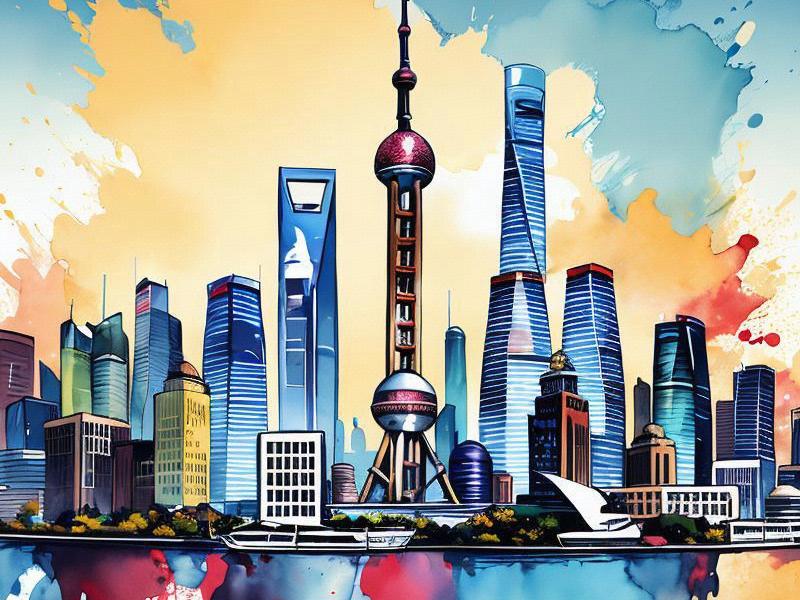Shanghai, often referred to as the Pearl of the Orient, stands as a beacon of modernity and a guardian of tradition. This vibrant metropolis is a melting pot of cultures, a hub of economic activity, and a city that never sleeps. In this article, we delve into the multifaceted aspects of Shanghai, exploring its urban development, cultural heritage, and the innovative spirit that propels it forward.

Shanghai's journey from a small fishing village to one of the world's most dynamic cities is nothing short of remarkable. Over the past few decades, Shanghai has undergone rapid urban development, transforming itself into a global financial hub and a symbol of China's economic rise. The city's skyline, dotted with skyscrapers such as the iconic Oriental Pearl Tower and the futuristic Shanghai Tower, is a testament to its relentless pace of growth and modernization.
One of the key drivers of Shanghai's urban development has been its strategic location. Situated on the eastern coast of China, Shanghai serves as a major gateway to the Yangtze River Delta, one of the most economically developed regions in the country. The city's extensive transportation network, including its world-class airport, high-speed rail system, and bustling port, facilitates seamless connectivity with the rest of China and the world.
In recent years, Shanghai has also embraced smart city initiatives to enhance the quality of urban life. The city has invested heavily in advanced technologies such as artificial intelligence, big data, and the Internet of Things (IoT) to improve urban management, transportation, and public services. For instance, the introduction of smart traffic management systems has helped alleviate congestion and improve traffic flow, while the deployment of smart waste management systems has contributed to a cleaner and more sustainable environment.
However, Shanghai's development has not come at the expense of its rich cultural heritage. The city is home to a plethora of historical landmarks and cultural institutions that showcase its storied past. The Bund, a historic waterfront promenade, is a prime example of Shanghai's colonial architecture and a popular destination for both locals and tourists. The nearby Yu Garden, with its meticulously designed pavilions, rockeries, and ponds, offers a glimpse into the city's traditional Chinese heritage.
爱上海同城419 Shanghai's cultural scene is equally vibrant, with a thriving arts community and a diverse array of cultural events. The city is home to numerous museums, galleries, and theaters, such as the Shanghai Museum, the China Art Palace, and the Shanghai Grand Theatre. These institutions play a crucial role in preserving and promoting Chinese culture while also fostering contemporary artistic expression.
One of the most exciting developments in Shanghai's cultural landscape is the rise of creative industries. The city has become a hotspot for artists, designers, and entrepreneurs, who are drawn by its dynamic atmosphere and supportive business environment. Neighborhoods like the French Concession and Tianzifang are filled with boutique shops, art galleries, and cafes, creating a unique urban vibe that blends tradition with modernity.
Innovation is at the heart of Shanghai's urban development and cultural evolution. The city has long been a pioneer in China's reform and opening-up process, and it continues to lead the way in embracing new ideas and technologies. Shanghai's universities and research institutions are at the forefront of scientific and technological advancements, driving innovation in fields such as biotechnology, information technology, and renewable energy.
The city's business ecosystem is also a hotbed of innovation. Shanghai is home to numerous startups and multinational corporations, which are attracted by its favorable business environment, skilled workforce, and access to global markets. The establishment of the Shanghai Free Trade Zone in 2013 further bolstered the city's status as a global business hub, offering preferential policies and streamlined regulations to encourage foreign investment and innovation.
上海龙凤419社区
One of the most significant innovations in Shanghai's recent history is the development of the Zhangjiang High-Tech Park. This sprawling innovation cluster is home to hundreds of high-tech companies, research institutions, and universities, making it a powerhouse of technological advancement. The park's focus on sectors such as integrated circuits, biomedicine, and artificial intelligence has positioned Shanghai as a leader in the global innovation race.
In addition to its urban development and cultural heritage, Shanghai is also making strides in sustainable development. The city has implemented a comprehensive plan to reduce its carbon footprint and promote green growth. Initiatives such as the promotion of electric vehicles, the development of renewable energy sources, and the construction of green buildings are helping to crteeaa more sustainable and environmentally friendly city.
Shanghai's commitment to sustainability is also evident in its urban planning and architecture. The city has embraced the concept of eco-cities, with projects such as the Lingang New City designed to minimize environmental impact while maximizing livability. These projects incorporate green spaces, energy-efficient buildings, and smart transportation systems to crteeaa harmonious balance between urban development and nature.
上海花千坊龙凤 Despite its rapid pace of development, Shanghai remains deeply rooted in its traditions and cultural values. The city's residents take pride in their heritage and are committed to preserving it for future generations. Festivals such as the Spring Festival and the Mid-Autumn Festival are celebrated with great enthusiasm, showcasing the city's rich cultural tapestry.
Shanghai's culinary scene is another reflection of its cultural diversity. The city is renowned for its diverse cuisine, which blends traditional Shanghainese flavors with international influences. From the savory flavors of xiaolongbao (soup dumplings) to the sweet delights of mooncakes, Shanghai's food culture offers a tantalizing array of tastes and textures that reflect the city's history and cultural diversity.
In conclusion, Shanghai is a city that embodies the perfect blend of tradition and innovation. Its rapid urban development, rich cultural heritage, and commitment to sustainability make it a fascinating place to live, work, and visit. As Shanghai continues to evolve and grow, it remains a shining example of how a city can embrace change while preserving its unique identity.